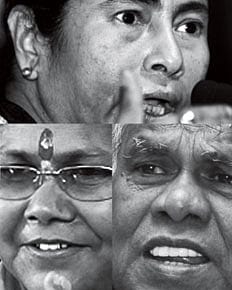A Matter of Good Taste

What is it that unites Mamata, Manjhi and the Sadhvi?
The stereotype still prevails: the cultural vulgarity of your average politician. He of crude sociology incompatible with the attitudes and aspirations of his country. You see him on the stump, spewing nouns and adjectives of hatred for the enemy imagined as well as real. You see him in his everyday banalities as an epitome of kitsch, which, as the novelist Milan Kundera said in the context of pre-89 Eastern Europe, is "the aesthetic ideal" of communism. In India, though, it is not ideological excesses that bring out the perversions and pathologies of politics— or the power of kitsch. It is a sense of privilege and autonomy that makes such a politician immune from cultural sensibilities. He can make, for instance, the most insensitive remark about women and get away with it because the English media or the English-speaking class doesn't understand the raw wisdom of the countryside. He can be an unapologetic casteist because he alone reads the social affinities and intimacies of sub-rural India. In 21st century India, where the buzz is all about being modern, he is not an anomaly, not an exception; he is an inevitability in a place where politics is one 'profession' where being in power is being out of the decencies and dignities of a social animal.
Particularly so in the age of Jitan Ram Manjhi, Sadhvi Niranjan Jyoti and Mamata Banerjee. The Chief Minister of Bihar, and worthy successor to the great value-based politician Nitish Kumar, and also a Maha-Dalit, the lowest of the under-classes, continues to pop up on front pages for all the right reasons from his perspective, which happens to be different from mine and yours. So, he alone knows what could happen to the women of Bihar when their husbands leave them behind and travel to other states for work. He alone knows, or maybe he alone has the political freedom to declare, that 'upper caste' people are foreigners and only Dalits and Tribals are Indian. Manjhi has previously spoken on other topics as varied as corruption and the marital morality of his son, drawing instant media attention. Why is it that this man can afford to be so crassly brazen about being offensive?
Imran Khan: Pakistan’s Prisoner
27 Feb 2026 - Vol 04 | Issue 60
The descent and despair of Imran Khan
You may say that it is the politics of a provincial socialist, a master of kitsch. Just to cite one example, think of vintage Lalu Prasad Yadav, whose long reign in Bihar was a badlands vaudeville starring a ruler of great comic possibilities, till the joke was on him and the morality of the show was unsustainable even among the shirtless he thought would never abandon him. The ruler as entertainer played with the mass mind, till the entertainment became too boring—and expensive—to be sold. It is not that political vulgarity is the preserve of only heartland socialists; the cardboard politics of Dravidianism and the comic-strip class wars of Indian communists (currently oxygen-less) are replete with salvation motifs of kitsch. Or look at the so-called lunatic fringe of Hindutva, perennially in need of a phantom enemy. Or, imagine what someone like Sadhvi Niranjan Jyoti, a minister of state, who has divided Indians between Ram's descendants and the illegitimate others, can do to the modernisation project of Prime Minister Modi. Or think of Bengal Chief Minister Mamata Banerjee's 'bamboo' obscenity. Bengal renaissance is memory; Bengal vulgarianism rhymes with Mamata's politics.
Manjhi and the Sadhvi—and other occasional artists of free speech in public life—tell a larger story of politics. It is one arena where sophistication of the mind is most required, and it is where some of the crudest minds are at play. I am sure this observation will be read as elitism— and challenged by those who see the raw vulgarity of certain politicians as an aspect of empowerment. It is not. It is all about politics and good taste. When Václav Havel, still a bit apologetic about being the president of what was then Czechoslovakia after years as a dissident and critic of power, was given an honorary doctorate by New York University, he made a speech about why good manners are essential for politicians. A good education in political science and law may be invaluable for a politician, but that is not the most important thing, he said: "When a man has his heart in the right place and good taste, he can not only do well in politics but is even predetermined for it. If someone is modest and does not yearn for power, he is certainly not ill-equipped to engage in politics; on the contrary, he belongs there. What is needed in politics is not the ability to lie but rather the sensibility to know when, where, how and to whom to say things."
Good taste in politics is not about class or caste; it is not about educational qualifications either. It is about refinement, about being sensitive. Professional anti-elitists will argue that this is democracy—take it or keep quiet. Not really. The politics of bad taste is the sewage system of democracy, and in India, it is broken and open. It stinks.
